Resources
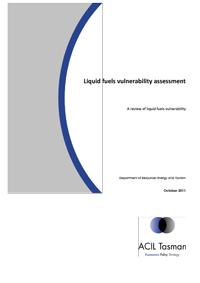 ,
, 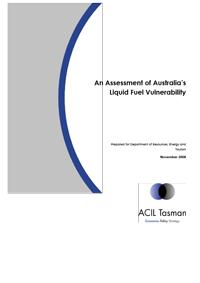
Date
Description
In 2009 and 2011, ACIL Tasman was engaged by the Federal Department of Resources, Energy and Tourism (DRET) to examine Australia's current level of liquid fuel vulnerability and significant trends which may affect this over the short, medium and longer term. The Liquid Fuel Vulnerability…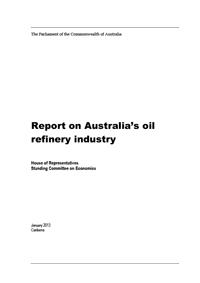
Date
Description
On 5 February 2013 the House of Representatives Standing Committee on Economics tabled its Report on 'Australia's Oil Refinery Industry', following the Committee's inquiry in 2012. The Inquiry was conducted in relation to claims and concerns being raised about the viability of Australia's oil…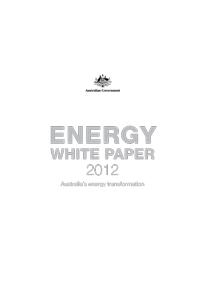
Date
Description
On 8 November 2012, the Australian Government released the 'Energy White Paper - Australia's Energy Transformation'. The 2012 Energy White Paper sets out the Australian Government's strategic policy framework to guide Australia's energy transformation to a cleaner and more productive energy economy…Date
Description
Liquid Fuel Supply Security and Reliability The Australian liquid fuel supply chain has considerable span and diversity. It includes crude and petroleum product shipments into and around Australia, refinery throughput, bulk fuel storage tanks, extensive terminal and distribution networks, over…Date
Description
Relying on shipping (for imports) does not increase security risks, and shipping lanes are not easily disrupted. Most countries are reliant on movements of petroleum (crude and product) within and between countries, and particularly so for Australia (in both an export and import sense).…Date
Description
Transport fuel imports do not increase risk for supply reliability and security A diversity of global supply sources and local import facilities provide a range of options for Australia. Australia is already dependent on imports to meet the growth in demand for transport fuels (eg. demand…Date
Description
The Federal Government has introduced regulation of the quality of petrol and diesel fuel in Australia. The principal drivers of the fuel quality regulation are environmental. The adoption of emerging vehicle engine and emission control technologies is a key strategy in the management of ambient…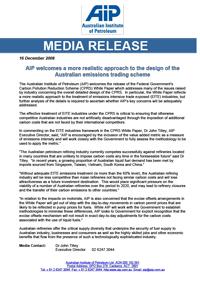
Date
Description
The Australian Institute of Petroleum (AIP) welcomes the release of the Federal Government's Carbon Pollution Reduction Scheme (CPRS) White Paper which addresses many of the issues raised by industry concerning the overall detailed design of the CPRS. In particular, the White Paper reflects a more…Date
Description
The Executive Director of AIP, Dr John Tilley said "the release of the report by the Prime Minister's Emissions Trading Task Group provides a considered basis for the Australian community to increase its efforts to respond to the climate change challenge. This report outlines a clear set of…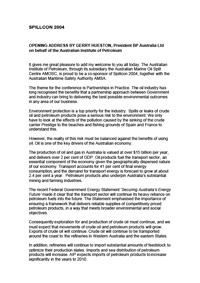
Date
Description
The Australian Institute of Petroleum today welcomed delegates to Spillcon 2004, the premier Marine Oil Spill Response conference in the Southern Hemisphere. The conference is sponsored by the Australian Marine Oil Spill Centre (AMOSC) and the Australian Maritime Safety Authority (AMSA). In…